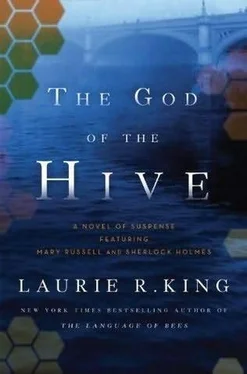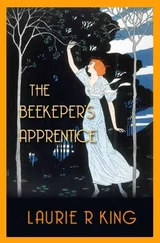I frowned and was about to ask how these various groups were funded if the central agencies were being cut back, when Holmes spoke up.
“You’ll have to tell her, Mycroft.”
My brother-in-law shifted as if his chair had become uncomfortable; I would have missed the giveaway gesture had I not been looking directly at him. Goodman’s rhythmic breathing continued without interruption; Mycroft lowered his voice, and began.
“Some thirty years ago, I found myself in a position to change this… impermanent nature of the empire’s Intelligence service. It was towards the end of the war between Japan and China, in 1895. A considerable amount of money had been… circumspectly allotted to influence the war in favour of China. There is no need to go into the series of events first delaying the funds and then obscuring their presence, but suffice it to say that when war had ended, much of the money was still there, in limbo, threatening to become something of an embarrassment were Japan to discover it.
“Those responsible for committing the funds assumed they had been spent, either during the war or as a portion of the indemnities. I was one of the few capable of tracing them precisely. To ask for their return would have opened up a can of worms that the Prime Minister did not wish to see opened. So I… removed the potential source of international chagrin by making the money disappear.”
“What? Wait-you stole government funds? You?”
“I stole nothing. I merely relocated them. With the Prime Minister’s full knowledge, I may add, although nothing was put to paper. The amount was considerable, and I invested it sensibly. The annual return keeps my operations running.”
I looked at Holmes, who was diligently studying the end of his cigarette, then back at his brother. I couldn’t believe it. Embezzlement? Mycroft?
My brother-in-law went on, as if he had confessed to taking home the office dictionary. “As I said, in the months since Cumming’s death, power has shifted in several directions. My own rôle in the Intelligence world has always been primarily that of observer, and although I do have direct employees, generally speaking I commandeer men from elsewhere when I require them.
“My illness came at a bad time. Decisions were being made with great rapidity last December, after the election but before Labour took over. One might even describe the mood as ‘panicked.’ The outgoing Prime Minister together with Admiral Sinclair set a number of Intelligence elements into stone, then brushed away the dust and presented the incoming Labour party with a fait accompli . And since Labour had been on the outside of policy, they could not know that this was not how things had always appeared.
“I lost two key months to illness. When I was fit enough to resume work in February, I thought at first the changes around me were due to the new régime. And as you no doubt heard even in foreign parts, there was consternation and loud doom-saying on all sides: The Socialists were expected to bring the end of the monarchy, the establishment of rubles as the coin of the realm, a destruction of marriage and family, and dangerously intimate political and economic ties with the Bolsheviks. Eight months later, the worst of the country’s fears have yet to be realised, and MacDonald has surprised everyone by being less of a firebrand than the village greengrocer.
“I expect you followed these issues to some degree during your travels. But when I returned to my office, it was nearly impossible to sift rumour from fact and policy from gossip. I felt there was something awry, I sensed a leak and a degree of manipulation, but everything had been overturned all around me, and in any case, the interference was very subtly done.
“Then in April, someone blackmailed my secretary.”
“Ah,” I said. So he did know about Sosa.
“Now, over the years I have collected nearly as varied a list of enemies as you, Sherlock. The immediate threat was from within, but whether it came out of the central SIS or one of the vestigial organisations was remarkably difficult to determine.
“So I set up a trap. And because my opponent had at least one finger inside my camp, it was possible he had more. I moved with caution, and attempted to appear oblivious.
“Which is terribly difficult! How do you manage it, Sherlock? Playing the idiot, I mean?”
“It helps to wear dark lenses,” Holmes remarked. “To conceal the intelligence.”
“Metaphorical dark glasses, in my case,” Mycroft said. “I have found the appearance of age and infirmity quite helpful in maintaining the façade of oblivion. And I might have managed to complete my trap and bait it, had it not been for the abrupt arrival of my nephew on the scene.”
“Because of Brothers?”
“The Brothers case proved both a blessing and a curse. On the one hand, that wretch’s acts drove a cart and horses through my tidy ambush. All of a sudden, the police were underfoot, with an all-out hunt for Damian, then for the two of you.
“However, once I began to look into the situation for you, I realised that it might be another in the series of incidents where I suspected my invisible opponent’s hand at work. It had become clear that Brothers had a guardian within the government, someone who greased official rails. One might think that there are a limited number of men who can establish new identities and arrange bank accounts, but in practice, a person who holds authority in one department can generally manipulate the machinery of another. And it can work informally, as well, or even indirectly: informally, in that when one knows the right people, one need only drop a word in a fellow club-man’s ear to have a protégé’s application speeded, his request granted. And indirectly, because a tightly knit group of school- and ’varsity-chums will grant one another favours without asking where the request originated.
“I was in the process of narrowing down the candidates when five uniformed constables came to the office to demand that I accompany them to New Scotland Yard. I have to say, I did not know whether to laugh or to take out my revolver.”
“Why did you not telephone the PM?” Holmes asked.
“Because I thought this might be the additional factor that brought my list of candidates down to one. I knew Lestrade had to be acting under orders-why else not simply come and talk to me?-but I wanted to know whose.
“Unfortunately, I do not think he knew himself. During our interview, he seemed almost sheepish, as if he’d been asked to take part in a play with rather too much melodrama for his taste. Still, it gave me a pathway to investigate, since there are a limited number of ways in which Scotland Yard can be reached.
“And I might have found it by now had it not been for the motorcar that pulled to the kerb thirty feet from the Yard’s entrance. In the back sat a large man with a scar across his left eyebrow and a gun in his hand.”
“Gunderson,” I supplied.
I became aware of an odd, breathy noise; it took me a moment to identify it as Goodman’s snores.
“And the driver?” Holmes asked.
“Another criminal type. Certainly no public-school boy.”
“They masked you?”
“A sack over my head. He then made me get on the floor, and we drove back and forth for twenty minutes or so before ending up very close to where we had begun, at a warehouse in Lambeth-an old warehouse, no doubt slated for development and therefore quite deserted. I could hear Ben’s chimes and smell the river, but I was well and truly trapped, and any noise would go unheard.
“I was minimally fed every eight hours, the water often lightly drugged. Until this past Wednesday, when the three o’clock meal was not only brought me by a new set of feet, it was so heavily drugged, I could see the powder residue in the cup. So I poured it on the floor, and waited.
Читать дальше












